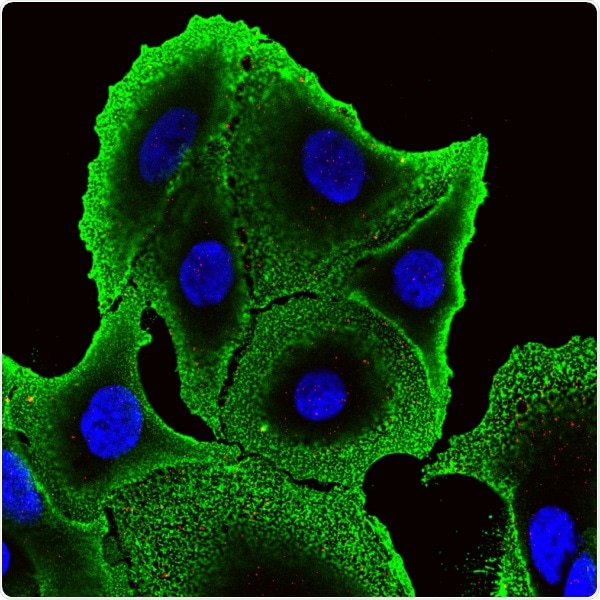Scientists and faculty of Vanderbilt University are in search of the “Achilles’ heel” of cancer cells that survive initial chemotherapy.

Chemoresistant SW480 colon cancer cells stained for lipid rafts (green), death receptor 4 (red), and cell nuclei (blue). Image taken using a Zeiss LSM 880 from the Vanderbilt Cell Imaging Shared Resource Center. Image Credit: Joshua Greenlee.
Michael King, chair of the Department of Biomedical Engineering, and Joshua D. Greenlee, graduate research fellow in biomedical engineering, have been exploring if a naturally occurring protein made in immune cells, called TRAIL, is effective in destroying colon cancer cells.
This understanding may allow the advancement of new therapies that make it possible to kill aggressive cancer cells easily before they spread to other body parts. The scientists identified that TRAIL is much effective in killing drug-resistant colon cancer cells.
We found that these cells had higher quantities of a protein called death receptor 4 on the cell surface. This receptor does just what the name suggests, causes the death of the cell upon binding to TRAIL. We also found that these death receptors were more likely to cluster together on the cell membrane in what are known as ‘lipid rafts’. When these receptors are found within these rafts, TRAIL is even more effective at killing cancer cells.”
Joshua D. Greenlee, Graduate Research Fellow, Department of Biomedical Engineering, Vanderbilt University
With this understanding, King, Greenlee, and their associates designed TRAIL-coated nanoparticles that efficiently kill 57% of cancer cells in the blood of patients with advanced chemo-resistant colon cancer.
In certain patient blood samples, the TRAIL-coated nanoparticles killed all detectable cancer cells, King stated. Higher levels of lipid raft death receptor 4 in these patients also corresponded with increased treatment efficacy of TRAIL-coated nanoparticles.
Why it matters
Patients require chemotherapy when colorectal cancer spreads to other organs in the body. Even though chemotherapy is successful at destroying cancer cells in early treatment, stronger surviving cells develop resistance to the treatment and may form new and highly lethal tumors.
These results are particularly encouraging for colorectal cancer patients that have failed chemotherapy. Patients with metastatic disease that have failed chemotherapy are often left with few treatment options. The use of TRAIL as a nontoxic nanoparticle becomes particularly appealing among these patients.”
Michael King, Chair, Department of Biomedical Engineering, Vanderbilt University
King is also a J. Lawrence Wilson Professor of Engineering.
What’s next
Additional studies will be focused on drug discovery efforts to change lipid raft compositions in cancer cells to influence their interactions with death receptors and increase the therapeutic benefits of TRAIL, added King. The long-term aim is to transform this research from the bench to the bedside, starting by testing TRAIL-coated nanoparticles in pre-clinical models.
Source:
Journal reference:
Greenlee, J. D., et al. (2021) Oxaliplatin resistance in colorectal cancer enhances TRAIL sensitivity via death receptor 4 upregulation and lipid raft localization. eLife. doi.org/10.7554/eLife.67750.